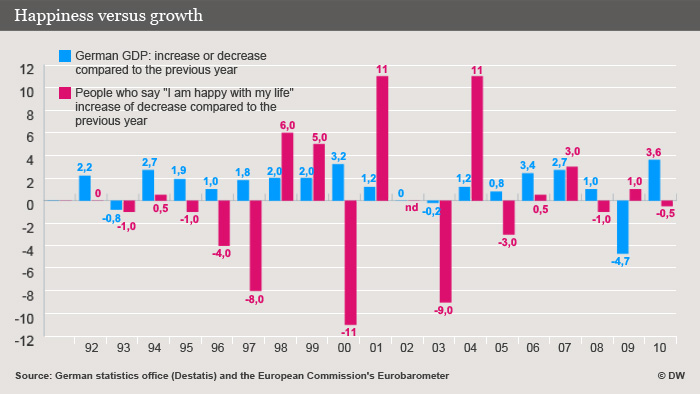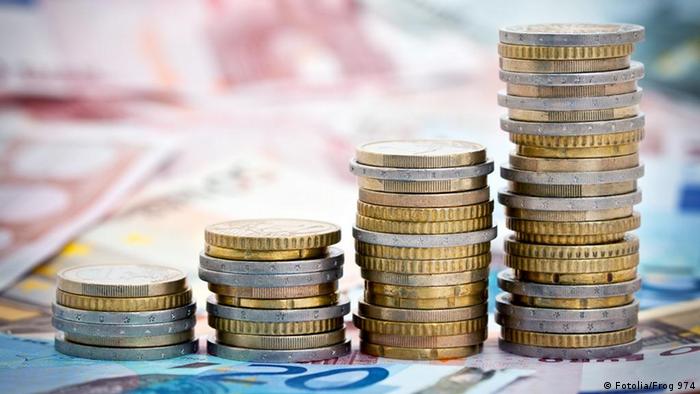In a world of limited materials, is continuous growth a realistic goal? The UN's Rio+20 summit will put the issue in the spotlight this June. Experts disagree about what good growth versus. bad really means.
Not all economists think all economic growth is always good. Ecuador's former energy minister, Alberto Acosta, made a strong distinction between growth and development to explain why.
"Economic growth does not equal development," he said. "Each form of growth has a social and an ecological story. There are both good and bad forms of growth."
Acosta and a panel of journalists, human rights experts and economists dissected the idea of economic growth at a recent conference on sustainable development. German aid agency Welthungerhilfe hosted the event in Bonn, Germany.
The panel also discussed the shortcomings of relying on the gross domestic product (GDP) as the primary way of gauging countries' well-being. The panelists discussed several alternative ways to get a more accurate picture.
GDP: an imperfect measure
Acosta criticized widely accepted growth models that focus almost exclusively on GDP, saying the metric does not take into account other important factors that affect growth rates.

One panelist suggested that only some countries slow down growth
A country's GDP represents the worth of all goods and services it produces in the course of a year. Full supermarket shelves, the latest medication, and taking one more vacation per year all factor into a country's GDP.
When the figure increases from the previous year, it means that the economy has grown. More production creates more jobs and sustains positions that already exist, according to the logic of GDP.
However, Acosta argued that GDP ignores pollution or wildfires caused by the extraction of raw materials, among other important issues. He said GDP also ignores the production and transportation of goods as well as the production of food, weapons, and the economic impact of social developments.
According to Acosta, industrialized countries follow economic plans to grow just for the sake of growth. He said he thinks such nations do not focus on people's actual needs. Moreover, they act at the expense of developing countries. Acosta said slower growth rates would make for better economic policy.
Unlimited growth not possible
During the panel discussion, German journalist Petra Pinzler focused on the idea of "unlimited growth."
She noted that economists who deal with the environment tend not to view growth as an unlimited possibility.
She said some economists think "economics and economies are part of the world - and the world is not flat, but round. And nothing can grow forever on something as limited as the Earth."
She noted that economists who deal with the environment tend not to view growth as an unlimited possibility.
She said some economists think "economics and economies are part of the world - and the world is not flat, but round. And nothing can grow forever on something as limited as the Earth."
From this point of view, economies should not rely on natural resources, since they will be completely spent at some point. Instead, economies should rely more on the kind of non-material growth that comes from the service industry.
Pinzler also argued that wealth - on its own - is not the best indication of happiness.

In highly developed countries like Germany, economic growth does not appear to make people happier
She cited studies on well-being that showed a correlation between happiness and economic growth in very poor countries. As the level of wealth within such countries increased, so did the level of well-being.
But after a certain point, the level of well-being no longer goes up as wealth does.
Good growth versus bad?
World Bank natural recourses expert Günter Schmidt disagreed with most of the panelists, saying growth at the global level is a reality.
"In a couple of years, we will have 9 billion people here on earth," he said. "Then we have growing incomes, in all countries, especially in India and China. Those people will ask for all kinds of goods and products, to eat and even more. Who is going to tell them you should not do that?"

A World Bank economist said you can't expect developing countries to put the brakes on growth
While Pinzler championed slower growth worldwide, Schmidt aired the idea of slowing down growth only in countries that are already saturated with industrial development.
In response to Pinzler's contention that increased growth does not guarantee an increased sense of well-being, Schmidt pointed to Greece. He said lack of growth in the economically beleaguered country has caused a drastic downturn in both wealth and happiness.
Looking ahead
The panel proposed that GDP be replaced as a measure of prosperity - or at least balanced against other factors such as environmental damage. The panel said such a step would reduce pressure on governments to constantly grow their economies just to maintain the status quo.
This June in Rio de Janeiro, Brazil, world leaders and representatives of civil society will focus on sustainable development at the United Nations' Rio+20 summit. Many developing countries remain skeptical about the idea of a "green economy" based on socially and ecologically sustainable growth.
Do you think countries should slow down their growth? We want to hear from you! Find out how to share your thoughts at the link below.
Author: Christina Ruta DW DE
Editor: Anke Rasper
Editor: Anke Rasper

Comments